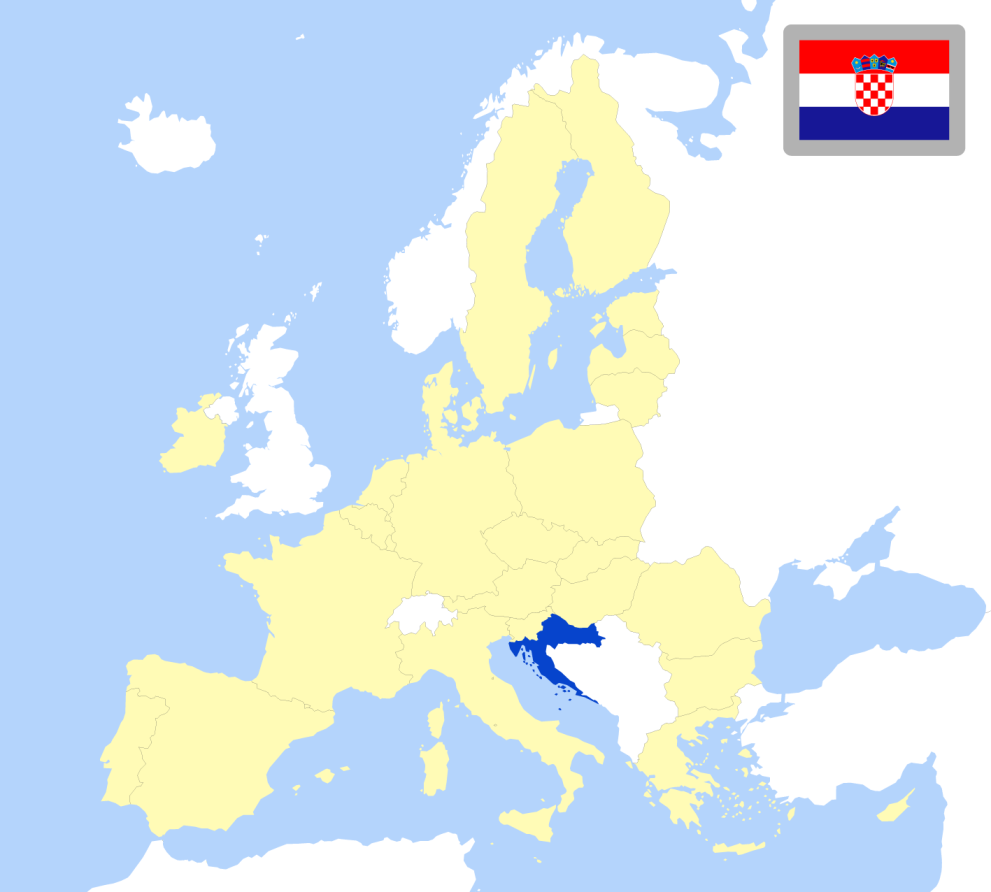Overview
Capital: Zagreb
Official EU language(s): Croatian
EU Member State: since 1 July 2013
Currency: euro (€)
Euro area: member since 1 January 2023
Schengen: member since 1 January 2023
Figures:
- Geographical size: 56 594 km2
- Population: 3 874 350
(Source: Eurostat - 2025 figures for geographical size and population)

Political system
Croatia is a parliamentary republic with a prime minister who is the head of government and a president who is the head of state. The government structure is based on separation of legislative, executive and judicial powers. The Parliament holds legislative power and also controls the executive. Its members are elected for 4 years.
Trade and economy
Croatia's GDP per capita of €29 000 ranks below the EU average (€38 100). It accounts for 0.5% of the EU's total GDP.
(Source: Eurostat - 2023 figures for GDP per capita and GDP)
(Source: Eurostat - 2024 figures for exports and imports)
There are 12 representatives from Croatia in the European Parliament. Find out who these Members of the European Parliament are and follow the activities of the European Parliament’s office in Croatia.
In the Council of the EU, national ministers meet regularly to adopt EU laws and coordinate policies. Representatives from the Croatian government attend Council meetings focused on their area of responsibility several times a year.
The Council of the EU does not have a permanent, single-person president (like the Commission or Parliament). Instead, its work is led by the country holding the Council presidency, which rotates every 6 months.
During these 6 months, ministers from that country's government chair and help determine the agenda of Council meetings in the different policy areas, and facilitate dialogue with the other EU institutions.
Dates of Croatian presidencies:
Jan-Jun 2020
The European Commissioner nominated by Croatia is Dubravka Šuica who is responsible for the Mediterranean.
The Commission is represented in each EU country by a local office, called a "representation". Find out more about the Commission's representation in Croatia.
Croatia has 9 representatives on the European Economic and Social Committee. This advisory body – representing employers, workers and other interest groups – is consulted on proposed laws, to get a better idea of the possible changes to work and social situations in different countries.
Croatia has 9 representatives on the European Committee of the Regions, the EU's assembly of regional and local representatives. This advisory body is consulted on proposed laws, to ensure these laws take account of the perspective from each region of the EU.
Croatia also communicates with the EU institutions through its permanent representation in Brussels. As Croatia's "embassy to the EU", its main task is to ensure that the country's interests and policies are heard and pursued as much as possible in the EU.
Budgets and funding
How does Croatia benefit from the EU budget?
The EU budget is the tool to ensure that Europe remains a democratic, peaceful, prosperous and competitive force. The EU uses it to finance its priorities and big projects that most individual EU countries could not finance on their own.
The benefits of EU membership significantly exceed the size of the EU budget contributions and the examples are many. All Member States benefit from being part of the Single Market, a shared approach to the common challenges of migration, terrorism and climate change, and concrete gains like better transport infrastructure, modernised and digitalised public services and cutting-edge medical treatment.
How much each EU country pays into the EU budget is calculated fairly. The larger your country's economy, the more it pays – and vice versa.
The EU budget is not about giving and taking – it’s about collectively contributing to making Europe and the world a better place for us all.
EU budget spending and revenue per country and per year
EU-funded projects in Croatia
Money from the EU budget helps fund programmes and projects in all EU countries – for example to build roads, subsidise researchers and protect the environment.
Find out more about how Croatia benefits from EU funding and recovery funds in your country or region.
